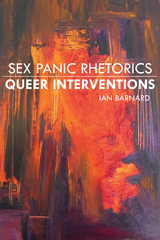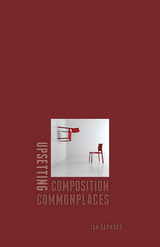
Analyzes the rhetoric of contemporary sex panics to expose how homophobia, heterosexism, and transphobia define public, political, and scholarly preoccupations with sexuality and gender
In Sex Panic Rhetorics, Queer Interventions, Ian Barnard makes the counter-intuitive argument that contemporary “sex panics” are undergirded by queerphobia, even when the panics in question don’t appear to have much to do with queerness. Barnard presents six case studies that treat a wide range of sex panic rhetorics around child molesters, sex trafficking, transgenderism, incest, queer kids, and pedagogy to demonstrate this argument. By using examples from academic scholarship, political discourse, and popular culture, including the Kevin Spacey scandal and the award-winning film Moonlight, Barnard shows how homophobia and transphobia continue to pervade contemporary Western culture.
Barnard is concerned not so much with looking at the overt homophobia and transphobia that are the more obvious objects of antihomophobic and antitransphobic critique. The author’s focus, rather, is on excavating the significant traces of these panics in a neoliberal culture that has supposedly demonstrated its civility by its embrace of diversity, renunciation of its homophobic past, and attentiveness to the transgender revolution that has swept popular media and political culture in the United States and elsewhere. During a time of increasing conservative backlashes against advancing LGBTQ rights and human rights discourses in general, this book shows why it is important to attend to the liberal covers for sex panics that are not too far removed from their rhetorically conservative cousins.

In Upsetting Composition Commonplaces, Ian Barnard argues that composition still retains the bulk of instructional practices that were used in the decades before poststructuralist theory discredited them. While acknowledging that some of the foundational insights of poststructuralist theory can be difficult to translate to the classroom, Barnard upends several especially intransigent tenets that continue to influence the teaching of writing and how students are encouraged to understand writing.
Using six major principles of writing classrooms and textbooks—clarity, intent, voice, ethnography, audience, and objectivity—Barnard looks at the implications of poststructuralist theory for pedagogy. While suggesting some evocative poststructuralist pedagogical practices, the author focuses on diagnosing the fault lines of composition's refusal of poststructuralism rather than on providing "solutions” in the form of teaching templates.
Upsetting Composition Commonplaces addresses the need to more effectively engage in poststructuralist concepts in composition in an accessible and engaging voice that will advance the conversation about relations between the theory and teaching of writing.
READERS
Browse our collection.
PUBLISHERS
See BiblioVault's publisher services.
STUDENT SERVICES
Files for college accessibility offices.
UChicago Accessibility Resources
home | accessibility | search | about | contact us
BiblioVault ® 2001 - 2024
The University of Chicago Press









